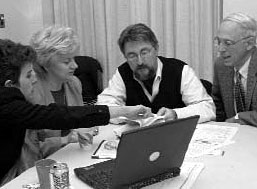The Russians are coming . . . to learn about digital libraries
When four Russian academics from the Republic of Karelia paid a visit to Dartmouth in October, they came to admire more than the fall foliage. Part of a partnership between DMS and Petrozavodsk State University and National Library, the twoweek visit was aimed at helping the Karelians make effective use of the latest digital biomedical information technology.
Retired Dartmouth cardiologist Ellis Rolett, M.D., began working with the Karelians in 1990 after becoming aware of how Soviet libraries had suffered under Communist rule. In 1999, two Russian librarians visited DMS. And in 2000, several envoys from Dartmouth—including Rolett and William Garrity, director of DMS's biomedical libraries —visited Karelia to help librarians there learn how to use online resources.
This fall's exchange was focused on ways to encourage partnerships between libraries and health professionals.
"The most important experience in being here [at Dartmouth] was to see that clinical, educational, and research pieces merge together," says Irina Ivanova, director of the National Library of the Republic of Karelia. "It's very important for me to determine what place a library takes in supporting this structure, and now I see that it has a key position in the system here. We have learned how to choose the right resources, because we don't have the money to buy all of them. Being here has helped us determine which resources are important."

|
|
Retired cardiologist Ellis Rolett, right, and Bill Garrity, center, director of Dartmouth's
biomedical libraries, helped a group of visiting academics from Russia make
sense of the world of digital information. The Karelians pictured here are family
physician Natalia Dorshakova, left, and Eugenia Sokolova, a language specialist. |
Databases: More than 30 Dartmouth experts led a variety of seminars during the Karelians' stay. After testing computer programs themselves and listening to presentations on topics ranging from accessing Internet databases to organizing digital information, Ivanova and her colleagues were able to determine which resources could best be utilized in their setting.
Among the resources that they found most intriguing were several evidence-based clinical medicine systems and the various departmental Web sites that have been created especially for medical students.
"There are important things that the Web can do that books can't," notes Martha McDaniel, M.D. The chair of DMS's anatomy department, she has worked to develop online resources for first-year anatomy students.
"The medical personnel in the group [of Karelians] could empathize with having difficulty in learning human anatomy," McDaniel explains. "In the Web site we have developed for our course, we have tried very hard to present only the anatomical concepts and facts that we think it's important for practicing physicians to grasp."
Site license: In addition, DMS has arranged for the Karelians to receive a complimentary site license for the OVID biomedical information system. Garrity, who negotiated the arrangement, explains that the package includes access to MEDLINE and pre- MEDLINE—powerful databases that can search the medical literature —as well as many digital journals and textbooks. It will also enable the Karelians to use a major English-language clinical information system.
Armed with this access to online resources and fresh ideas about digital information, the Karelians returned home to consolidate their knowledge. Dartmouth, meanwhile, has been refining a document delivery service through which the Karelians can request articles not available on OVID. The partnership's future plans include arranging additional exchanges between Dartmouth and Petrozavodsk librarians, developing a Petrozavodsk-Dartmouth Web site, and making OVID available to all users of the Karelian library system.
Attitudes: Although Rolett was pleased with the success of the latest exchange, he realizes that socioeconomic factors in Russia could play a role in how quickly progress occurs there. Not only is the Karelians' acquisition of digital resources dependent on the generosity of American vendors, but traditional Russian attitudes support hierarchical— rather than democratic—access to education.
"Nevertheless," Rolett concludes, "there appears to be growing awareness of the potential that information technology offers the university and healthcare providers, and beginning evidence that the government in Karelia may be willing to apply some of its extremely limited resources to support information programs. It is our hope that the recently completed visit will further that trend."
Katrina Mitchell
If you would like to offer any feedback about this article, we would welcome getting your comments at DartMed@Dartmouth.edu.
